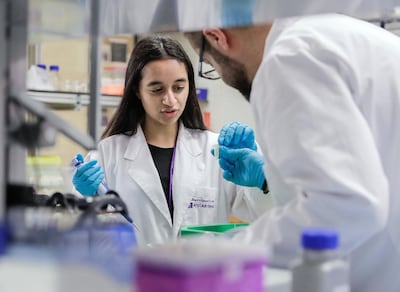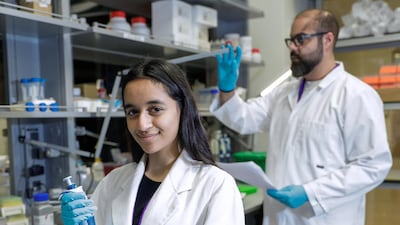Like many teenagers, Alia Al Mansoori has a list of things to do before she turns 30.
But her goals are a little loftier than most, as the 16-year-old science prodigy has her sights set on not only changing the world for the better - but exploring outer space, too.
She is intent on making good on her promise, and join some illustrious company in making her mark in the field of science at an early age.
The enterprising Emirati is already on the fast track to accomplishing her mission, after becoming New York University Abu Dhabi’s youngest researcher.
Albert Einstein redefined the laws of physics when he revealed his theory of special relativity at the age of 26.
He would claim that a person who had not made a great contribution to science before they turned 30 would never do so.
It is a deadline that Alia, who also wants to visit Mars, is determined to meet.
She revealed that she is in a rush to make scientific breakthroughs that will prove “revolutionary” for humanity.
The 11th grader, a pupil at Al Mawakeb school in Dubai, began her placement as a scientific research fellow last week and told The National that the environment had already inspired her.
“It’s really a big honour – in a few days I learned so much,” she said. “A lot of scientists at the end of their career reach the one big scientific discovery that completely revolutionises them as people, and revolutionises humanity or the society they live in. I want to do that earlier on so that I can do even more things in the future.

“I’m coming here to NYU Abu Dhabi at such a young age, so I’m hoping that will help me to do something really big for the benefit of humanity as a whole.
“My dream is to do something related to space – a really big piece of research that would be able to help humans go to space and be able to live there safely and healthily. That’s the goal for me.”
During her two-year placement at the university, Alia will work on developing laboratory skills, carrying out tissue cultures, RNA and protein extractions and cell staining methods. She touched on the areas in a proposed experiment that won her the UAE Genes in Space award in 2017.
That award led to Alia’s experiment, designed to help understand how being in space would impact on DNA and genes, being carried out on the International Space Station, where it proved a success. She also spent last summer enlisted in a training programme at Harvard University.
After completing school, she hopes to study in America, with Massachusetts Institute of Technology and Stanford University currently top of her list, before taking a Masters or PhD. She still wants to become an astronaut, and hopes to have visited space by the time she is 30. She plans to become one of the first people ever to visit Mars and intends to one day plant the UAE flag on the surface of the red planet.
She said she had loved science ever since she was a small child and credits her brother Mohammed, who is 10 years older and is now a forensic scientist, with being particularly influential in helping to develop her passion.
“Every time we’d have dinner or lunch we’d sit together and he’d ask me random science questions, and I’d ask him questions,” she said.
“As little as six years old, I knew things about DNA and rockets. That all goes back to my siblings and my parents, who weren’t scientists but went out of their way to research things to help me gain the information.”
But it is not only science which Alia has a passion for. Despite being only 154cm tall, she has taken up combat sports, and said remaining active is helping her research.
“I love doing all sorts of thing – one thing I love so much at the moment is Brazilian jujitsu,” she said.
“I’ve loved the sport for a long time and I’ve just recently started doing it. I love the techniques, how it’s a sport of the mind before it’s a sport of the body. I’m pretty short, so Brazilian jujitsu really helped me feel strong and confident about myself and concentrate more in the lab.”

